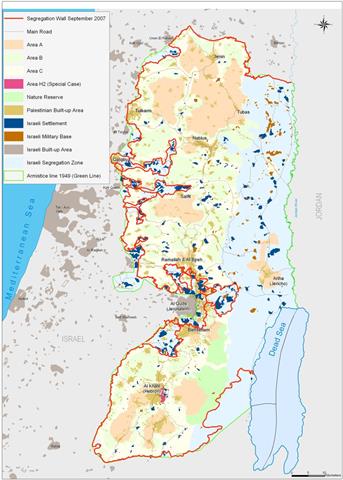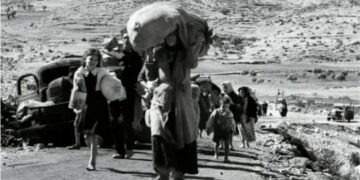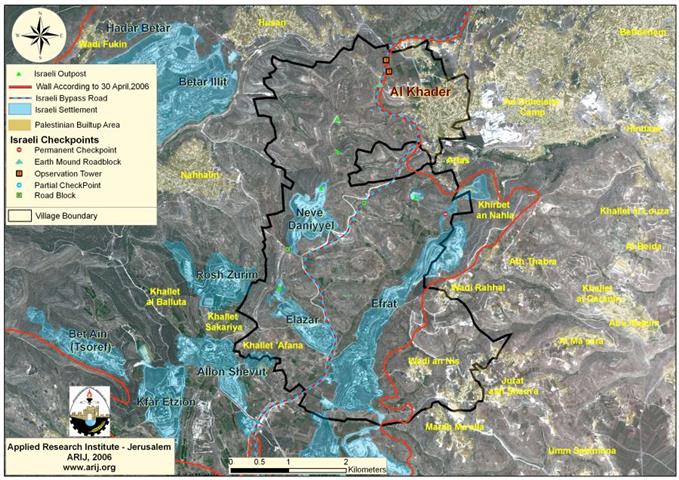It is without doubt at this time, that the peace process between Palestinian and Israelis is going nowhere. In fact if anything is happening, it is deteriorating more and more and on a daily bases. It is not the lack of actual negotiation itself; it is the in-productivity that such rounds of negotiations harvested throughout the years is what makes the need for tangible steps to cause tangible changes on the ground.
Today, it is easily said and confirmed the old-new perception that the Israeli settlements in the occupied Palestinian territory, stands to be one of the foremost obstacles, and maybe the most existing obstacle to ever achieving any real progress with the peace process. The existence of the Israeli settlers is an angel manipulated at such time (more than ever before) by the Israeli governments to justify the occupation of the West Bank territory. It also became a concession by the parties’ involved and even beyond that that the Israeli settlements are major obstacles and they are blocking progress even in other important final status issues such as Jerusalem, borders, etc.
Since the peace process started between the Israelis and Palestinians, it was made clear that the settlements will prevent of having a viable sustainable Palestinian state. Since the signing of the Oslo accord in 1993, Israel has more than doubled the area occupied by the Israeli settlements from 69 Km square (1.2% of the West Bank area) to an overall 188 Km square in 2008 (3.3% of the West Bank area). This also applies to the number of Israeli settlers whose numbers soared from 240 thousands to some 500 thousands in 2008, an increase by 109%. See Map 1

Map 1: Distribution of Israeli Settlements in the West Bank
Even with the settlements’ challenging issue as is, the Israelis have encouraged a new phenomenon, which started back in 1996; better known as the outposts. This phenomenon started out with the encouragement of Israeli officials who called upon settlers to grape hold of whatever land, particularly hilltops. Since 1996, the Israeli settlers were able to establish 232 outposts with the help and support of the Israeli Army who provided protection to these settlers and facilitated the work to get all infrastructures necessary to the location sites of the outposts.
If this says anything; it shows how Israel wanted peace with Palestinians to look like, in best case to serve their interest in the West Bank; and one may only speculate but may also easily conclude that the Israelis had no intention for a just peace based on the UNSC resolution 242, which is the base on which the Oslo accord was finalized.
Israel's colonization of the Occupied Palestinian Territory (OPT) violates numerous United Nations Security Council and General Assembly Resolutions, primarily UN Security Council Resolution 242 (1967). UNSCR Resolution 242 calls for 'the withdrawal of all Israeli armed forces from the territories occupied' in the 1967 war. UNSC 242 effectively outlaws Israel’s 42-year occupation of the West Bank (including East Jerusalem) and the Gaza Strip.
The principles of Resolution 242 are reiterated again in Security Council Resolution 452 (1979) which calls upon 'the Government and people of Israel to cease, on an urgent basis, the establishment, construction and planning of settlements in the Arab territories occupied since 1967, including Jerusalem,' the Security Council Resolution 446 (1979) which '[d]etermines that the policy and practices of Israel in establishing settlements in the Palestinian and other Arab territories occupied since 1967 have no legal validity and constitute a serious obstruction to achieving a comprehensive, just and lasting peace in the Middle East' and a further time in Security Council Resolution 465 (1980). Israel's continued refusal to implement these binding resolutions means that it belligerently occupies the OPT. As an occupying power, international humanitarian and human rights laws also bind Israel.
The first major document of international humanitarian law, The Hague Regulations of 1907, contains specific provisions outlawing Israel’s colonization activities. The destruction of Palestinian civilian property and the seizure of Palestinian lands to build Israeli colonies, by-pass roads and the Segregation Wall is explicitly outlawed by Hague Convention IV, Article 23 (G), which clearly states that the occupying power is forbidden “to destroy or seize the enemy's property, unless such destruction or seizure be imperatively demanded by the necessities of war.”
Israel’s colonization program also violates the most important document of international humanitarian law- the Fourth Geneva Convention Relative to the Protection of Civilian Persons in a Time of War (hereinafter the Convention). In particular, Israel's settlements are built, and expanded, upon appropriated Palestinian land. Settlement construction is often preceded by military action, including the destruction of Palestinian property such as homes or olive groves. The destruction of civilian property is prohibited by Article 53 of the Convention which states that: 'Any destruction by the Occupying Power of real or personal property belonging individually or collectively to private persons, or to the State, or to other public authorities, or to social or cooperative organizations, is prohibited, except where such destruction is rendered absolutely necessary by military operations.'
Article 147, moreover, defines 'extensive destruction and appropriation of property, not justified by military necessity and carried out unlawfully and wantonly' as a 'grave breach' of the Convention and defines these breaches as War Crimes. The High Contracting Parties (signatories) to the Convention are therefore required to 'enact any legislation necessary to provide effective penal sanctions' to stop Israeli colonization activities and prosecute Israeli officials in an international court.
Israel’s settlement policy is also strictly forbidden by the Fourth Geneva Convention. In addition to violating the prescriptions against destruction to civilian property, Israel’s program of populating the settlements with Jewish citizens violates Article 49 of the Convention. Article 49 states that 'the occupying power shall not deport or transfer parts of its own population into the territories it occupies.'
Prepared by:
The Applied Research Institute – Jerusalem












